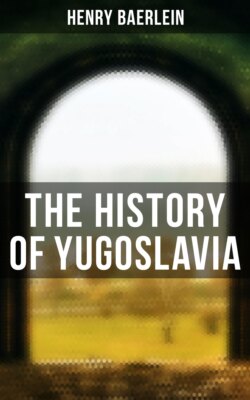Читать книгу The History of Yugoslavia - Henry Baerlein - Страница 99
На сайте Литреса книга снята с продажи.
FOOTNOTES:
Оглавление[36] Memorie per la storia degli arvenimenti che seguirono in Dalmazia la caduta della Republica veneta, by G. Cattalinich, 1841.
[37] This is perpetuated by the initial letters of the saying "Samo sloga Srbina spasava" ("Only in the union of Serbs is salvation"), which are placed round the cross in Serbia's coat of arms.
[38] Cf. La Dalmatie de 1797–1815, by the Abbé Paul Pisani. Paris, 1893.
[39] His fame as a teacher was such that several towns entreated him to settle in their midst. In 1845 the inhabitants of Stara Zagora sent him this curious letter: "When Philip, King of Macedonia, invited Aristotle to be the tutor of his son, he wrote to him: 'I am happy, in the first place, because God has given me a son, and, secondly, because this son was born in your time. … ' And we also, we thank God, firstly, because it has been granted to us to found a school, and, secondly, because we know that under your direction it will be a real school. That is why we supplicate and pray that you will come to us and be our teacher."
[40] Smail Aga, Vice-Governor of Herzegovina, had earned for himself the greatest detestation of the Montenegrins, whom he harried, and of his own unhappy subjects. In August 1840 he was attacked by a small band of heroes, men of Montenegro and of Herzegovina. He and a large number of his men were killed. A translation of this celebrated poem was made by Mr. J. W. Wiles at Salonika, and printed there, under difficult circumstances, entirely by Serbian refugees.
[41] Cf. Fiume Italiana. Rome, 1919.
[42] According to the census of 1857 the figures were: Serbs, 452,500; Roumanians, 414,900; Germans, 394,100; Magyars, 256,100; Jews, 12,500; Gipsies, 600.
[43] Their German origin had become so completely obliterated that they no longer spoke anything but Croat. It is curious in this connection to note that Kossuth, the champion of Magyarism, was of Slav blood; that Rieger, the Czech leader, was of German blood; and that Conscience, chief of the Flemish movement, had a French father.
[44] Cf. Seton-Watson's The Southern Slav Question. London, 1911.
[45] Cf. Letters of Count Cavour, edited by Gl. Chiala, vol. iv. pp. 139–140.
[46] This lady, the Princess Julia, subsequently married the Duke of Aremberg. She died in February 1919 in Vienna at the age of eighty-eight. In the early sixties she came on a mission to England to enlist sympathy for Serbia's final struggle for independence. Much to her annoyance she found that it was necessary to ask through the Turkish Embassy for an audience with Queen Victoria. However, the Ambassador was a very affable person, who completely mollified the Princess. It was to her that Palmerston made one of his famous puns. Her dress caught in a door and he stepped forward with the words: "Princesse, la Porte est sur votre chemin pour vous empêcher d'avancer."
[47] As a matter of fact he was walking with a girl called Catharine, also a relative, a lame girl more remarkable for wit and wisdom than for physical beauty. She and Michael are celebrated in one of Serbia's most famous songs. There has been a great deal of speculation as to his assassins, some maintaining that they were Austrian agents, others holding that it was the work of the rival Karageorgevič dynasty. A certain Radovanovič who settled down in Karlovci—he was there at any rate till 1895—was most probably an Austrian instrument in this affair; he in his turn making use of Austrian police for the actual deed. He was wont to say that he knew who were the murderers; but since he was looked upon as a mere tool, his fellow-Serbs of Karlovci did not molest him. Yet he never frequented a Serbian café. He was a travelled, pretty well-educated man; with the Austrian officials he was on very friendly terms, and the source of his money was never discovered.
[48] The Turks, the Greeks and the Slavons: Travels in the Slavonic Provinces of Turkey-in-Europe. London, 1867. The second edition of this book appeared with a preface by Gladstone.
[49] Cf. his Histoire diplomatique de l'Europe.
[50] The promulgation was a surprise to him; it was also a defeat, as he had aimed at a direct understanding between Greeks and Bulgars and not at a solution which left the Porte as arbitrator between these two Christian races. However, he would not acknowledge that he had been beaten. "He thought it more intelligent to recognize the fait accompli and not to let his dissatisfaction be visible," says Prince George Troubetzkoi, the distinguished diplomat who explored the archives of the Russian Embassy at Constantinople. In reply to his telegram announcing the promulgation of the firman, Gortchakoff, the Prime Minister, cabled that "an adjustment of this awkward question and one that would not break the links between the Bulgarian community and the Œcumenical Patriarchate would be a great alleviation, whereof the credit would be mostly yours." The Russians repudiated the Exarchate publicly and they are not now, as are the Serbs, in communion with the Bulgars. For example, when the Bulgarian bishops in Macedonia, after the troubles following the first Balkan War, went to Russia in order to state their case, they were taken to a monastery and not allowed to participate in the religious offices.
[51] Le droit italique de Fiume. Bologna, 1919.
[52] In Land and Water, June 5, 1919.
